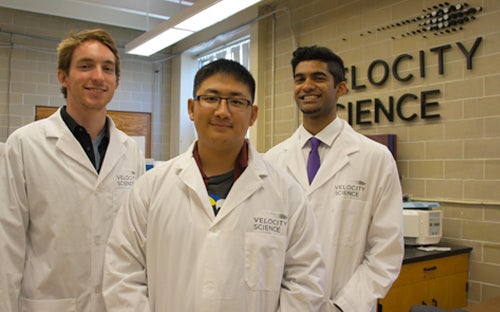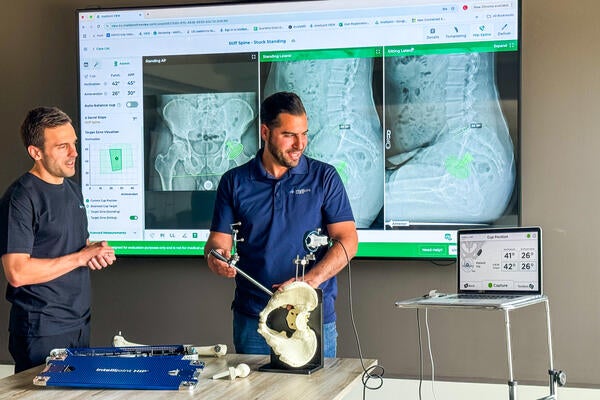
Waterloo startup: Testing your Vitamin D levels at home
Vitameter, a Velocity Fund Finalist, is developing a device that will let you find out in minutes if you have enough Vitamin D

Vitameter, a Velocity Fund Finalist, is developing a device that will let you find out in minutes if you have enough Vitamin D
By Annette Van Gerwen Marketing and Strategic CommunicationsVitamin D, known as the “sunshine vitamin,” is essential to human health and now a team of Waterloo entrepreneurs want to give you a way to test for it in the comfort of your home.
Vitameter, a startup founded by three University of Waterloo nanotechnology engineering students, is developing an at-home testing device that will give you results in minutes rather than going to a lab and waiting days.
“Vitameter is bringing nanotechnology to consumers to help them take control of their health,” says company co-founder James MacLean.
The team, which is working out of Waterloo’s Velocity Science program, includes Lucas Lim and Nirushan Udayakumar. Velocity Science, a partnership between Waterloo's entrepreneurship program and the Faculty of Science, is a discovery space for companies focused on life and physical sciences. It provides research lab space for students to develop their ideas.

(Left to right) James MacLean, Lucas Lim, Nirushan Udayakumar
Similar to at-home blood glucose level monitoring used by many diabetics today, the Vitameter model for measuring vitamin D involves a pin prick and a drop of blood on a stick. The blood sample is inserted into the Vitameter device where it is filtered, analyzed and measured using nano-materials.
Vitamin D is insufficient or deficient in more than 40 percent of Canadians, according to a 2013 Statistics Canada report. Vitamin D deficiency has been linked to a weakened immune system, seasonal affective disorder (SAD), osteoporosis, Alzheimer’s disease, and cancer.
MacLean praises the University of Waterloo for its world-class nanotechnology engineering program; its co-operative education program and the Velocity entrepreneurship program which is helping them commercialize the device.
“These are the programs that are making Vitameter happen,” he says.
Vitameter is one of ten finalists that will compete for one of four $25,000 prizes at the Fall 2014 Velocity Fund Finals which will take place on Nov. 27. For more information on the Velocity Fund Finals and to register for a spot in the audience, please visit the Velocity Fund Finals website.
Velocity is designed to support entrepreneurial students and alumni with free workspace and expert coaching as they build businesses. The non-academic program includes the Velocity Garage and Foundry incubation spaces in downtown Kitchener. In addition to Velocity Science on the main campus, there is also the Velocity Residence, which houses 70 entrepreneurial students and the Velocity Fund, which awards more than $300,000 in grants to startups each year.

Read more
Two University of Waterloo affiliated health-tech companies secure major provincial investment to bring lifesaving innovations to market

Read more
New medical device removes the guesswork from concussion screening in contact sports using only saliva

Read more
Here are the people and events behind some of this year’s most compelling Waterloo stories
The University of Waterloo acknowledges that much of our work takes place on the traditional territory of the Neutral, Anishinaabeg, and Haudenosaunee peoples. Our main campus is situated on the Haldimand Tract, the land granted to the Six Nations that includes six miles on each side of the Grand River. Our active work toward reconciliation takes place across our campuses through research, learning, teaching, and community building, and is co-ordinated within the Office of Indigenous Relations.